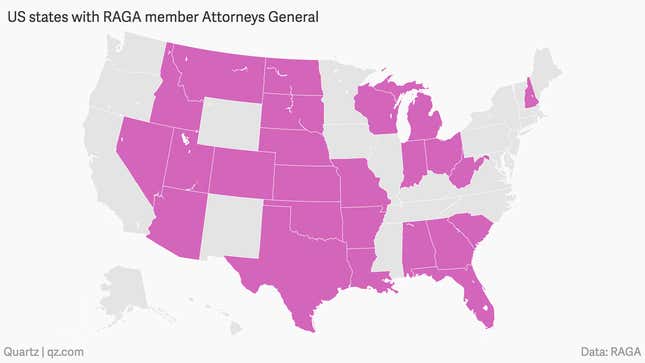Attorneys general in many US states are part of a secret online network that enables corporate donors to review and comment on public policies before they’re made, according to a joint article by The Intercept and Maplight, a bipartisan group examining money’s influence on US politics.
“The Briefing Room” is a file-sharing network and online bulletin board hosted by Box, a Redwood City, California-based cloud-content website that claims 41 million users. The policy arm of the Republican Attorneys General Association (RAGA), which tries to get Republicans elected as state attorneys general, has been using the board to allow donors to review and comment on laws before they are passed, according to Intercept and Maplight’s investigation.
A contribution of at least $25,000 gives donors “posting access” to the online board, RAGA membership documents show.
Democratic attorneys general have been in the news in recent months for their blocking of Donald Trump’s travel ban and attempts to dismantle Obamacare subsidies, but Republican AGs have been the ones growing their influence in recent years. In 2014, Republicans took the majority of state AG seats for the first time in US history; they now hold 29 of them.
State attorneys general offices are often where challenges to federal laws are initiated. Republican AGs have been “have been instrumental in unraveling policies enacted by the previous Administration,” RAGA’s website claims, including the Clean Power Plan and a rule that would have boosted overtime pay for over 4 million Americans.
Policy documents posted to the Briefing Room include drafts of challenges to the overtime law, and arguments against a rule that prohibited payday lenders from making loans to people who can’t pay them back. The rule has been put on hold by the Trump administration.
State open-records laws generally require local lawmakers to disclose information about how public policy decisions are made. An attorney at the Campaign Legal Center, a DC-based nonprofit, told Intercept and Maplight that it looked like the bulletin board was being used to “evade their transparency requirements.”
RAGA’s website has a list of its members, with their social media contact information. Members of the public can submit Freedom of Information Act requests to their states for more information about how laws are made.

